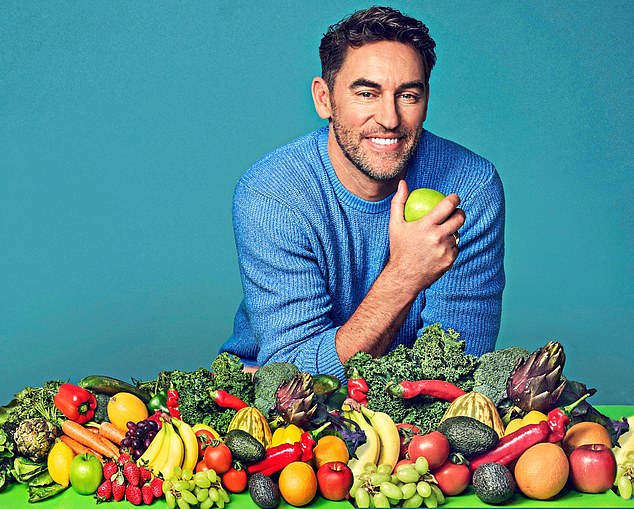Table of Contents
It’s one of those vegetables that most people either love or hate.
You may be surprised to learn that beets have also occasionally divided some scientists who have debated their benefits.
This is because beets are high in nitrates and nitrites, molecules made of nitrogen and oxygen that are also found in red meat and are responsible for the harmful effects of foods such as bacon and ham.
Compounds in processed meat are thought to react with other molecules in the body and increase the risk of cancer.
In my work as a nutritionist, clients often ask me if this means that vegetables containing nitrates, such as beets, also pose a risk. In fact, I tell them that the opposite is true.
Rob Hobson is an award-winning nutritionist. His book, Unprocess Your Life, is packed with recipes and ideas to help you cut down on processed foods.

One of the reasons beets can give your body a boost is because they are particularly rich in folate. Folate, also called vitamin B9, is found primarily in dark green leafy vegetables, beans, peas, and beets.
Nitrates and nitrites are dangerous in some types of meat because, when combined with chemicals in the body, they create molecules called N-nitroso compounds (NOCs), which can increase the risk of rectal tumors forming during digestion.
But in vegetables, they enter the body where they are converted into nitric oxide, a substance that can dilate blood vessels, reducing the risk of high blood pressure and therefore heart disease.
The high nitrate content in beets can also help you run, swim and bike faster.
Research has shown that large amounts of this compound can increase oxygen efficiency, meaning that for a given amount of effort, athletes can perform at a higher level with less oxygen.
Andy Jones, Professor of Applied Physiology at the University of Exeter, has been researching the effects of beetroot on athletic performance.
He found that nitrates in beets improve blood flow to the lungs and muscles, resulting in faster delivery of oxygen.
This means you can potentially work harder without feeling strain.
In a 2009 study led by the University of Exeter, researchers found that drinking beetroot juice increased endurance.
The study involved eight men aged between 19 and 38. They were given 500 ml per day of organic beetroot juice for six consecutive days before completing a series of tests that included riding a stationary bike.
On another occasion, they were given a placebo drink of blackcurrant cordial for six consecutive days before completing the same cycling tests.
After drinking beet juice, the group was able to cycle for an average of 11.25 minutes, which is 92 seconds longer than when they received the placebo.
However, eating raw beets appears to have a stronger effect on lowering blood pressure compared to when the vegetable has been cooked or pickled.
This is because the cooking process reduces the levels of nitrates and antioxidants.
However, the benefits of beets far outweigh their nitrate content.
One of the reasons beets can give your body a boost is because they are particularly rich in folate.
Folate, also called vitamin B9, is found primarily in dark green leafy vegetables, beans, peas, and beets.
There are around 109 micrograms of folate in half a pack of beetroot (100 g), which is about half of the recommended daily intake.
It plays an important role in the production of red blood cells.
Adequate folate levels help prevent anemia, which is characterized by fatigue, weakness, and shortness of breath.
The vitamin is also critical for DNA synthesis and repair, which is essential for cell division and growth, particularly during periods of rapid growth such as pregnancy and childhood.
In fact, the NHS recommends that women take 400 microgram folic acid tablets every day before pregnancy and up to 12 weeks into pregnancy.
This is because it is vital for the correct development of the fetus.
Helps prevent neural tube defects (NTDs), such as spina bifida and anencephaly, which are serious birth defects of the brain and spine.
The high levels of folate in beets also help keep cardiovascular diseases at bay.
Folate helps regulate levels of the amino acid homocysteine in the blood.
Elevated levels of homocysteine are associated with an increased risk of cardiovascular disease because it can damage the lining of the arteries.
Beets also contain natural pigments called betalains, which have powerful anti-inflammatory properties.
Since chronic inflammation is linked to various conditions such as obesity, heart disease, and liver disease, these pigments present in beets can have a positive impact on our overall health.
Researchers at Queen Mary University of London examined the effects of daily consumption of beetroot juice high in inorganic nitrate on nitric oxide levels and inflammation.
They conducted a study with 114 healthy volunteers, dividing them into two groups.
One group received a typhoid vaccine to induce systemic inflammation, while the other group was given a cream to create localized inflammation through a small blister.
Participants drank 140 ml of beetroot juice every morning for seven days; half consumed nitrate-rich juice and half drank nitrate-free juice.
Those who consumed nitrate-rich beet juice exhibited higher levels of nitric oxide markers in their blood, urine, and saliva.
This group also had lower levels of inflammatory monocytes and the remaining monocytes were more anti-inflammatory.
The nitrate-rich juice appeared to restore the function of the endothelium, the layer of cells that lines blood vessels, which is typically affected during inflammation.



